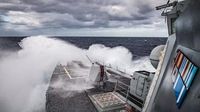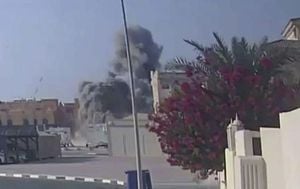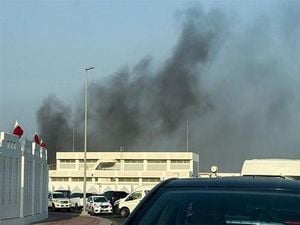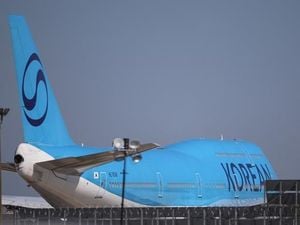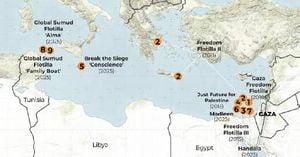Three U.S. Navy guided-missile destroyers are steaming toward the waters off Venezuela, marking a dramatic escalation in President Donald Trump’s campaign to clamp down on Latin American drug cartels. The move, confirmed by multiple U.S. officials and widely reported by outlets including the Associated Press and American media, signals Washington’s intent to use military might in a region already fraught with tension and political posturing.
The ships in question—the USS Gravely, USS Jason Dunham, and USS Sampson—are part of the Aegis-class, known for their advanced missile defense and combat capabilities. According to a U.S. official briefed on the operation, the destroyers are expected to arrive in the Caribbean soon and will remain on deployment for several months. The purpose: to support counter-narcotics operations and put pressure on criminal organizations accused of flooding the United States with fentanyl and other dangerous drugs.
This isn’t just a routine show of force. President Trump has made no secret of his desire to use the U.S. military as a tool against drug cartels, which he blames for a surge of illicit substances and violence in American cities. In recent months, he’s ramped up calls for aggressive action, not only at home but also abroad. Trump has pushed Mexican President Claudia Sheinbaum to take a harder line against organized crime, urging her to intensify Mexico’s campaign against its own cartels. However, Sheinbaum has drawn a firm boundary, repeatedly rejecting the idea of U.S. military intervention on Mexican soil and citing her nation’s sovereignty as non-negotiable.
The deployment of warships comes on the heels of a series of bold moves by the Trump administration. In February 2025, the U.S. government designated Venezuela’s Tren de Aragua gang, El Salvador’s MS-13, and six Mexican criminal groups as foreign terrorist organizations. This is a distinction typically reserved for extremist outfits like al-Qaida or the Islamic State group—entities that use violence to achieve political ends. Applying the label to profit-driven drug cartels is rare, but Trump’s team contends that the groups’ international reach and their mix of drug trafficking, migrant smuggling, and violent territorial expansion justify the classification.
“The international connections and operations of these groups—including drug trafficking, migrant smuggling and violent pushes to extend their territory—warrant the designation,” a Defense Department official told the Associated Press, speaking on condition of anonymity because they were not authorized to discuss military planning.
The Trump administration’s crackdown hasn’t stopped at organizational designations. Earlier this August, Washington doubled the reward for the capture of Venezuelan President Nicolás Maduro to a staggering $50 million. The U.S. accuses Maduro of being one of the world’s most prominent narco-traffickers, collaborating with criminal cartels to flood American streets with fentanyl-laced cocaine. These are not new allegations: back in 2020, during Trump’s first term, Maduro was indicted by a New York federal court on charges of narco-terrorism and conspiracy to import cocaine, with an initial $15 million bounty on his head.
Venezuelan officials have responded with a mix of defiance and indignation. Foreign Minister Yvan Gil, in a statement issued on August 19, dismissed Washington’s accusations as baseless and politically motivated. “Washington’s accusing Venezuela of drug trafficking reveals its lack of credibility and the failure of its policies in the region,” Gil declared, as reported by the Associated Press and other outlets. “While Washington threatens, Venezuela steadily advances in peace and sovereignty, demonstrating that true effectiveness against crime is achieved by respecting the independence of its peoples. Every aggressive statement confirms the inability of imperialism to subdue a free and sovereign people.”
President Maduro, for his part, has painted the U.S. actions as part of a broader campaign of intimidation. Speaking at a public event in Caracas on August 18, he accused the United States of escalating its threats against Venezuela’s peace and stability. Without directly mentioning the deployment of the U.S. destroyers, Maduro announced plans to mobilize more than 4.5 million civilian militia members across the country. These militias, originally formed by the late President Hugo Chávez, are composed of volunteers intended to support the armed forces in defending Venezuela against both external and internal threats.
“The empire has gone mad and has renewed its threats to Venezuela’s peace and tranquility,” Maduro said, in remarks covered by American and Venezuelan media. His government has not officially commented on the U.S. naval deployment, but Maduro’s rhetoric leaves little doubt about his stance.
The arrival of U.S. warships in the region is expected to be closely monitored by Venezuela and its allies. While the stated mission is to support counter-narcotics efforts, the symbolism of American destroyers off the Venezuelan coast is hard to ignore. It’s a clear message—not just to the cartels, but to the Maduro government and perhaps to other regional actors—that the U.S. is willing to flex its military muscle in pursuit of its security objectives.
This strategy, however, is not without controversy. Critics argue that the broad application of the “terrorist organization” label to criminal groups risks blurring the lines between law enforcement and military action, potentially escalating conflicts and complicating international cooperation. There are also concerns about the effectiveness of such operations: history shows that large-scale military deployments rarely solve the underlying social and economic drivers of the drug trade.
Meanwhile, the Trump administration maintains that extraordinary measures are justified by the extraordinary threat posed by transnational criminal organizations. By designating groups like Tren de Aragua and MS-13 as terrorist entities, the U.S. government can unlock new legal tools and resources to pursue their leaders, disrupt their finances, and target their networks across borders.
For Venezuela, the pressure is mounting on multiple fronts. The doubling of the reward for Maduro’s capture is a clear sign that Washington is not backing down. The mobilization of millions of militia members suggests that Caracas is bracing for the possibility of further confrontation. And with U.S. destroyers soon to be visible on the horizon, the standoff between the two countries is entering a new and unpredictable phase.
As the destroyers draw closer, the world will be watching to see whether this latest show of force leads to meaningful progress against the cartels—or simply adds another chapter to the long and troubled history of U.S.-Latin American relations.
